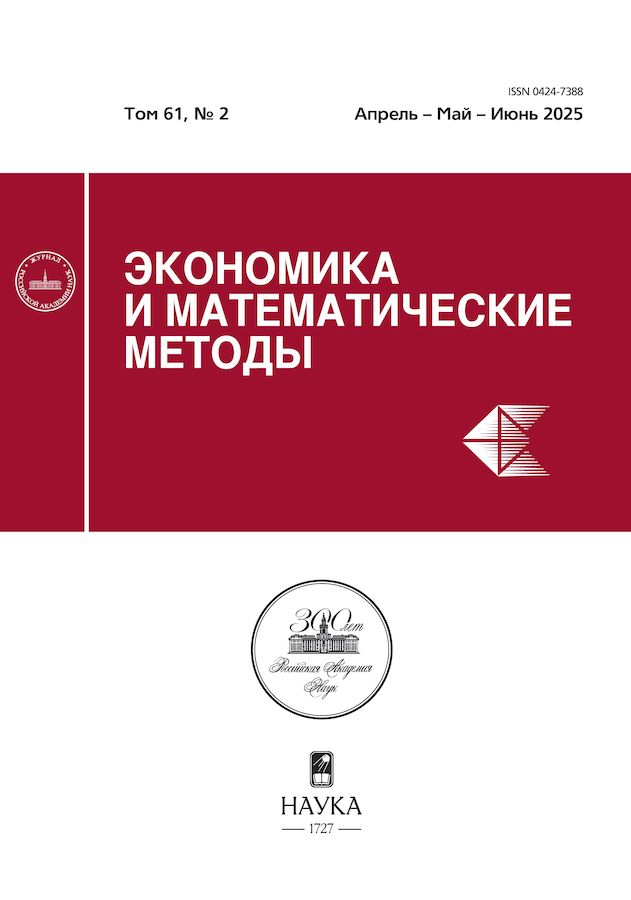The effectiveness of the main information criteria in choosing the best short-term economic forecasting model
- 作者: Svetunkov S.G.1
-
隶属关系:
- Peter the Great St. Petersburg Polytechnic University
- 期: 卷 61, 编号 2 (2025)
- 页面: 118-127
- 栏目: Mathematical analysis of economic models
- URL: https://vestnik.nvsu.ru/0424-7388/article/view/684539
- DOI: https://doi.org/10.31857/S0424738825020094
- ID: 684539
如何引用文章
详细
Any theory is based on a certain axiomatic core, which includes axioms and postulates. The latter includes conclusions and results from other theories or branches of science that are accepted in this theory without proof. Among such postulates accepted in modern economic forecasting are informational criteria, which are used to select the best forecasting model from a set of competing ones. Most often, forecasters use two main criteria — Akaike and Schwarz. The article demonstrates, using the example of short-term forecasting of 120 different data series through AR(p) autoregressions, that in practice this tool does not perform as well as expected. An alternative to the informational criteria can be a criterion based on Bayesian hypothesis testing, which is outlined in the article. This criterion incorporates information about the likelihood of describing prior and posterior data, the cross-accounting of which corresponds to Bayesian selection. A comparative analysis of the application of informational criteria and the new criterion, the results of which are presented in the article, supports the latter criterion, which is recommended for practical use.
全文:
作者简介
S. Svetunkov
Peter the Great St. Petersburg Polytechnic University
编辑信件的主要联系方式.
Email: sergey@svetunkov.com
俄罗斯联邦, Saint Petersburg
参考
- Аистов А. В., Николаева Т. П. (2019). Гипотеза о стимулирующем воздействии туризма на ВВП // Прикладная эконометрика. Т. 56. С. 5–24. [Aistov A. V., Nikolaeva T. P. (2019). Hypothesis about the stimulating impact of tourism on GDP. Applied Econometrics, 56, 5–24 (in Russian).]
- Светуньков И. С., Светуньков С. Г. (2024). Методы и модели социально-экономического прогнозирования. Учебник и практикум для академического бакалавриата. Т. 1. «Теория и методология прогнозирования». М.: Издательство Юрайт. 351 с. [Svetunkov I. S., Svetunkov S. G. (2024). Methods and models of socio-economic forecasting. Textbook and practical training for the academic bachelor’s degree. Vol. 1. Theory and methodology of forecasting. Moscow: Yurait Publishing House. 351 p. (in Russian).]
- Светуньков С. Г. (2023). К вопросу о выборе лучшей прогнозной модели. В сб.: «Фундаментальные и прикладные исследования в области управления, экономики и торговли». Сборник трудов Всероссийской научно-практической и учебно-методической конференции. Санкт-Петербург, 15–19 мая 2023 года. Часть 2. С. 258–266. [Svetunkov S. G. (2023). On the issue of choosing the best forecast model. In: “Fundamental and applied research in management, economics and trade”. Collection of proceedings of the All-Russian scientific, practical and educational conference. St. Petersburg, May 15–19, 2023. Part 2, 258–266 (in Russian).]
- Тимофеев В. С., Фаддеенков А. В., Щеколдин В. Ю. (2015). Эконометрика. Учебник. Новосибирск: Изд-во НГТУ. 354 с. [Timofeev V. S., Faddeenkov A. V., Shchekoldin V.Yu. (2015). Econometrics: Textbook. Novosibirsk: NSTU Publishing House. 354 p. (in Russian).]
- Akaike H. (1974). A new look at the statistical model identification. IEEE Transactions on Automatic Control, 19, 6, 716–723.
- Akaike H. (1973). Information theory as an extension of the maximum likelihood principle. Second International Symposium on Information Theory. Edited by B. N. Petrov and F. Csaki. Budapest: Akademiai Kiado, 267–281.
- Berrar D. (2019). Cross-validation. In: “Encyclopedia of Bioinformatics and Computational Biology”. Reference module in Life Sciences, 1. Amsterdam: Elsevier, 542–545. doi: 10.1016/B978-0-12-809633-8.20349-X
- Degiannakis S., Filis G., Klein T., Walther T. (2022). Forecasting realized volatility of agricultural commodities. International Journal of Forecasting, 38, 1, 74–96.
- Emmert-Streib F., Liu J., Cherifi H., Kauffman S., Yli-Harja O. (2024). Moving beyond simulation and learning: Unveiling the potential of complexity data science. PLOS Complex Systems, 1 (2). doi: 10.1371/journal.pcsy.0000002
- Gilliand M. (2020). The value added by machine learning approaches in forecasting. International Journal of Forecasting, 36, 1, 161–166.
- Gold C. (2020). Fighting churn with data. N.Y.: Manning Publications. 504 p.
- Knafl G. J., Ding K. (2016). Adaptive regression for modeling nonlinear relationships. Springer International Publishing. 375 p.
- Knuppel M. (2014). Efficient estimation of forecast uncertainty based on recent forecast errors. International Journal of Forecasting, 30, 2, 257–267.
- Kolassa S. (2020). Will deep and machine learning solve our forecasting problems? Foresight, 57, Spring, 13–18.
- Makridakis S., Hibon M. (2000). The M3-competition: Results, conclusions and implications. International Journal of Forecasting, 16, 451–476.
- Mills T. C. (2019). Applied time series analysis: A practical guide to modeling and forecasting. London: Elsevier Science. 354 p.
- Ord K., Fildes R., Kourentzes N. (2017). Principles of business forecasting. N.Y.: Wessex Press, Inc. 544 p.
- Pritularga K. F., Svetunkov I., Kourentzes N. (2021). Stochastic coherency in forecast reconciliation. International Journal of Production Economics, 240 (7), 108221. doi: 10.1016/j.ijpe.2021.108221
- Schwarz G. (1978). Estimating the dimension of a model. The Annals of Statistics, 6, 2, 461–464.
- Shaikh A. A., Irfan Ali A. A., Cárdenas-Barrón L.E. (2021). Optimal decision making in operations research and statistics: Methodologies and applications. Abingdon: CRC Press. 434 p.
- Shittu O. I. (2009). Comparison of criteria for estimating the order of autoregressive process: A Monte Carlo approach. European Journal of Scientific Research, 30, 3, 409–416.
- Svetunkov S., Svetunkov I. (2024). On the issue of choosing the best predictive model based on Bayesian principles. In: T. C. Devezas, M. A. Berawi, S. E. Barykin, T. Kudryavtseva (eds.) “Understanding the digital transformation of socio-economic-technological systems. Lecture Notes in Networks and Systems”. Vol. 951. Cham: Springer. doi: 10.1007/978-3-031-56677-6_8
- Tallman E. W., Zaman S. (2017). Forecasting inflation: Phillips curve effects on services price measures. International Journal of Forecasting, 33, 2, 442–457.
- Weakliem D. L. (2016). Hypothesis testing and model selection in the social sciences. N.Y.: The Guilford Press. 202 p.
- Zhang J., Yang Y., Ding J. (2023). Information criteria for model selection. WIREs Computational Statistics, 15 (5), e1607. doi: 10.1002/wics.1607
补充文件









